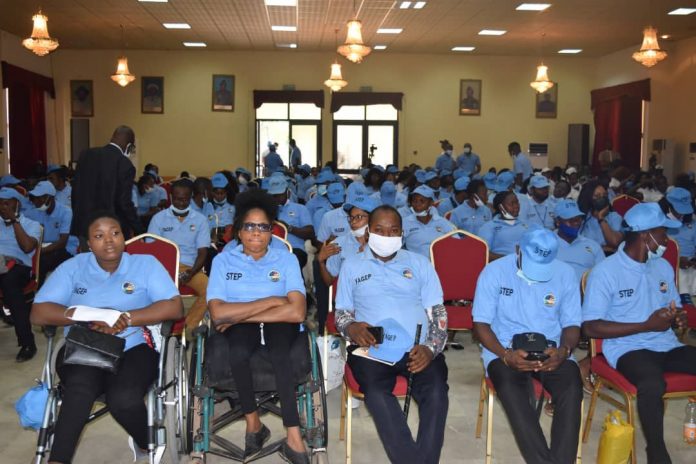By Gertrude Onyekachukwu-Uteh and Ese Laura Oghene
Stakeholders in the Agricultural Industry have assembled to identify solutions to various challenges plaguing the sector in Nigeria and Sub-Saharan Africa.
This was the overarching goal at the 7th Agricultural Policy Stakeholders Forum and 1st Annual International Conference organized by the Agricultural Policy Research Network (APRNet) in Asaba.
The 2-day conference with the theme, “Towards a Resilient and Sustainable Agri-Food System by 2025 in Nigeria and Sub-Saharan Africa” was attended by relevant stakeholders in the agricultural sector such as entrepreneurs in agribusiness, the academia, top government functionaries, public servants and political appointees both in the public and private sectors across the country and abroad.
In his keynote address entitled, “Youth Employment and Wealth Creation through Agricultural Entrepreneurship: The Delta State Model as Evidential Case for Paradigm Shift, the State Chief Job and Wealth Creation Officer and the Head of the State Job and Wealth Creation Bureau, Prof Eric Eboh, harped on the goals of his paper.
According to him, “the goal is to demonstrate, using live evidence from Delta State, that youth agricultural entrepreneurship is a veritable strategy for not only solving youth unemployment but creating wealth and promoting a resilient and sustainable agri-food system.”
He stated that youths could take advantage of the huge economic opportunities
along the agricultural value chain through active participation in agriculture for self-employment using the targeting approaches, which he described as a deliberate effort tailored to suit the circumstances, constraints and needs of youths.
“Delta state YAGEP model is programmed to solve youth unemployment and to develop agricultural value chains through youth agricultural entrepreneurship: agricultural skills training, internship and support for start-ups as well as support for marginal (surviving) enterprises; and to train, equip, establish and sustain youth agricultural entrepreneurs for self-employment and economic independence,” he emphasized.
Identifying solutions to poor youth participation in agricultural value-chain, the job creation bureau boss said lessons learnt in the seven years of YAGEP implementation in the state are the answer and should be adopted by other states.
He classified the solutions into three which are breaking the barriers to youth participation in the agricultural value chain; receiving unwavering political support, and the Programme Learning Curve which is the readiness to use genuine feedback for self-correction.
He noted that from 2015 to 2021, YAGEP has produced 2,298.46 metric ton (MT) of meat; 72,680, 767 MT eggs; 6,682.91 MT fish; 2,342.25 pigs; 3,084.40 MT cassava among other crop commodities through the active participation of 1,520 beneficiaries in Fish, Poultry, Piggery and Crop Productions.
He maintained that with the right mix of the success enablers and drivers such as the conditions, factors and processes adopted in the implementation of YAGEP over the years, youth agricultural entrepreneurship is effective in tackling youth unemployment; and holds great potentials for promoting a resilient and sustainable agri-food system.
Earlier during the opening ceremony, the President of APRNet, Dr. Anthony Onoja, said the goals of the conference was based on the lingering food crisis in the world due to climate change and conflicts which have made life difficult for families in Nigeria and Sub-Saharan Africa.
He emphasized that the challenges motivated APRNet to bring together scholars and stakeholders in the agricultural sector to dialogue on the way out of the shortfall in food supply, poverty, hunger, malnutrition, migration caused by climate change and invasion by herdsmen and boko haram, which he pointed out has given rise to many internally displaced persons’ camps in the country (IDPs.)
“Food inflation is high. People cannot afford decent meals even among the middle class.
How do we get out of this mess? Nigeria was better than this. We are looking for solution. To eradicate hunger and poverty, the government should adopt innovation.
“Government should be open to implementing research results that advocate for innovations in reviving the agricultural food system, developing agricultural food value chain and improving access to food inputs to farmers. Farm inputs should be made available at the right time to enable them utilize them to achieve result.
“It was reported that Anchor Borrowers’ Programme loan got to some farmers late when they did not need it, making the propensity to default high.
“Government should be timely to dispense whatever input they have and to provide the enabling environment in terms of security to boost food production,” he stated.
He explained that after their deliberations, a communique would not only be issued and published in scholarly global journals, but would be used for policy formulation and implementation by the Federal Ministry of Agriculture and Natural Resources.
The highpoints of the opening ceremony were the delivering of goodwill messages by APRNet partners and presentation of papers by other speakers.

















